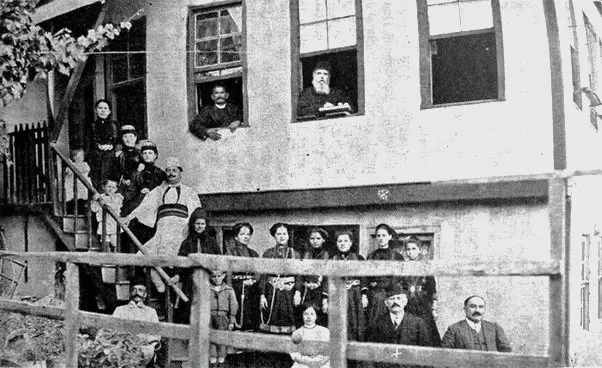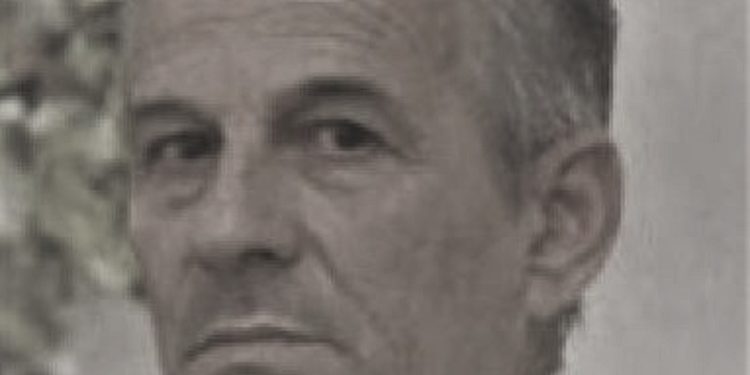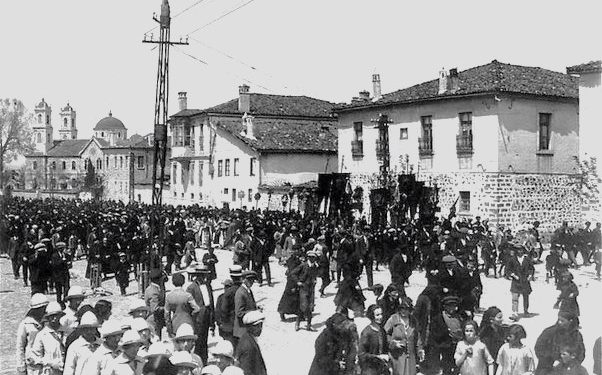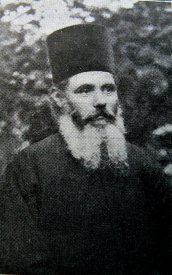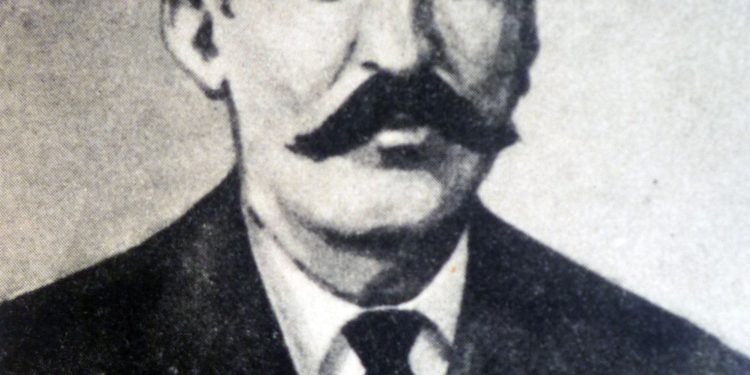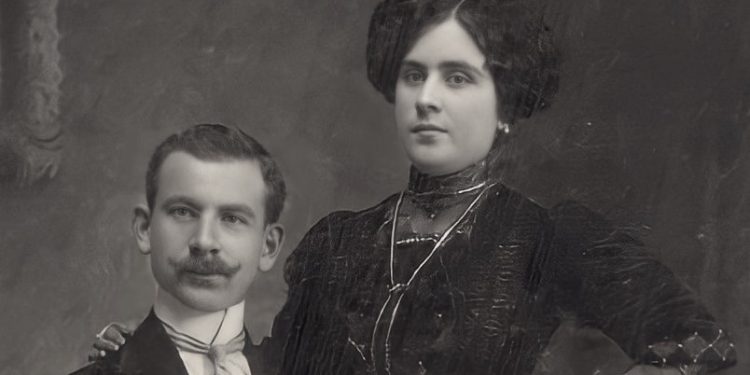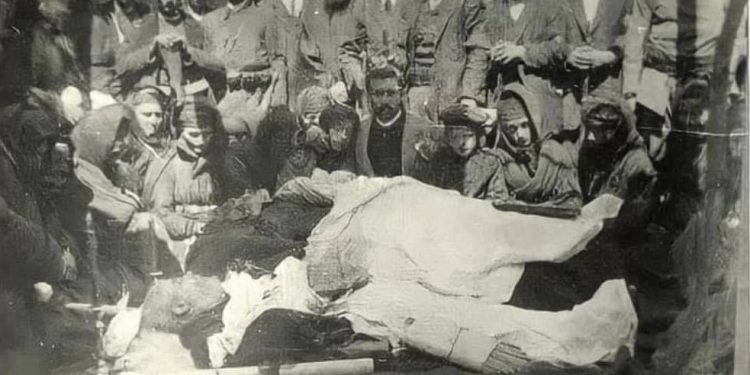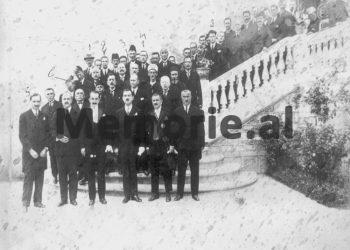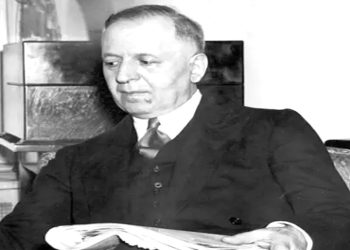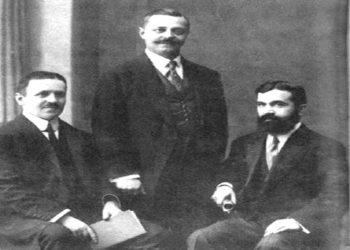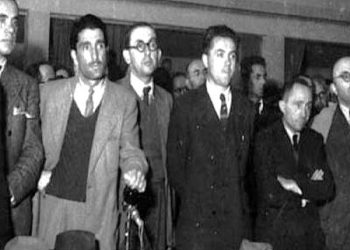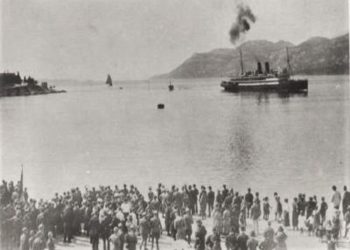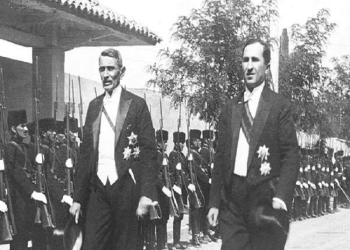By Vepror Hasani
Memorie.al In 1914, the Orthodox clergy, Papa LLambo Ballamaçi, Sotir Ballamaçi, Vasil Tallabaku, Vangjel Balajana, Vasil Face, Albanian clergymen of the Ballamaçi family in Korça, were executed, killed by Greek andarts, because of teaching in the Albanian language and opposing the Greek clergy. Papa Llambro Ballamaçi, had been waiting for them to come for three days, but they were not showing up. If they did come, his death would be certain. Bayonets would be thrust into him without any mercy, in every part of his body. They would brutally massacre him, until his soul would no longer cry and they still would not believe that he had given up his life. Even after he was dead, they would kill him again for fear that he would be resurrected.
If you hadn’t come, he would have had the opportunity to live long and see what would happen to the fate of Korça; otherwise, his eyes would have remained open even after death, worrying about what would happen to Korça, after this. I was thinking about these things, Papa Llambro Ballamaçi, thinking about those days when a real massacre had begun in Korça.
In the streets of the city, women and children were being slaughtered without mercy. On March 20, according to the old calendar, or April 2, 1914, according to the new calendar, the so-called; “Uprising of Northern Epirus” had broken out in Korça. The Greek andarts were massacring all those who had come against them.
One of these was Papa Llambro Ballamaçi. There was no doubt about Ballamaçi, the andarts would come to take him and from that day on, he would never be able to return to his home. They came! They came towards the house of Papa Llambro Ballamaçi, after three days of fighting, on March 23, or April 5, with the new calendar. As they surrounded his house, one of the Andarts began to shout: “Papa Llambro, come out, they are looking for you”! Ballamaçi sat for a moment in thought.
What more could he do, at that moment?! He had no other choice. He had to leave the house and go to his death. They had no intention of forgiving him, and Papa Llambro Ballamaçi knew this well. It was not the first time they had tried to kill him, but until then, they had never had the courage.
This time, he had no chance of escape. The city had fallen into the hands of the Andarts and the streets of Korça were bleeding. A small resistance was enough and his head would be cut off. They had old scores with Papa Llambro, and now he had to settle them all with his life. In 1883, Ballamaçi opened a Romanian school in Korça so that the Vlach children could learn their language, while he secretly taught the Albanian language to the Albanian children who attended this school. All of this reached the ears of the Greek Church.
The Despot of Korça almost went mad. It was easier for him to die of despair, or to kill himself in a canal where sewage flowed, than to hear that the Albanian language was being revived. He did his utmost to report it to the Turkish government, hoping that when the Sultan heard that this man was teaching the Albanian language to the children of Korça, he would order Papa Llambro to be beheaded, but in reality, this did not happen.
The Romanian school was under the protection of the Romanian state. On the certificates that came out of that school, it was written: Korça- Albania. This made the Despot of Korça fall into even deeper despair. He would never forget the opening of the Romanian School and Papa Llambro Ballamaçi. Ballamaçi was making his life miserable. The thugs who surrounded Papa Llambro Ballamaçi’s house continued to wait for him to leave the house. If he delayed even a little longer, they would enter and drag him out of there. The voice of the thug calling out was heard again: “Papa Llambro, come out, they are looking for you”! In all the streets of Korça, gunshots and women’s screams could be heard.
Somewhere, in the alleys, people’s heads were being cut off and houses were being burned. There was a war going on, for life or death. It was not known how many were killed. The self-willed troops, or as they were otherwise called “gendarmerie troops”, had been fighting against the Andarts for three days. They were eagerly awaiting Ballamaç’s departure. The Metropolitanate of Korça had informed the Andarts about everything it knew about Pope Llambro Ballamaç.
In 1887, Pandeli Sotiri from Selçka in Gjirokastra opened the first Albanian school in Korça. Many boys and girls attended that school, but the Greek Church did its utmost to intimidate parents who wanted to teach their children the Albanian language. Anyone who sent their children to school would be excommunicated and would remain cursed, generation after generation.
There would be no place for them in the next world either. And the Greek Church managed to succeed. Orthodox children abandoned Albanian school. The school was in danger of being closed. Now the Despot of Korça was almost dying of joy, but his smile was cut in half again by Papa Llambro Ballamaçi. He took half of the students of the Romanian school and took them to the first Albanian school.
They would stay there until the children who had run away in fear returned. Now he had to give an account, for this too. Papa Llambro was getting ready to leave. He knew he would never return. In the Ballamaçi house, late at night, Orhan bey Pojani, Mahmud bey Pojani, Thimi Marko, etc. would come.
They would gather around the fire and talk about the Albanian language and then they would sing a song that they liked a lot:
“When this foreign locust,
When this tyrant, this barbarian,
Will trample us in the ground, or even say,
When he will cry us out, alive in the grave…”!
Orhan Pojani, who looked like a piece of rock that could not be moved by anything, wept without stopping the song. The Andarts who had surrounded the house of Pope Llambro Ballamaçi had come to take revenge for everything that Pope Llambro had done against the Greek Church. They had always wanted to kill him, but they had never been able to.
His murder could have brought many troubles and discontent to the Vlach believers. They had tried repeatedly to intimidate him, but without any result. They even threatened him with death, but again he did not give up his path. In 1890, he went to Istanbul as a delegate for the creation of a Romanian Bishops’ Conference in Turkey. During that time, he also had the opportunity to meet with Naim Frashëri, Murat Toptan and other patriots.
Pope Llambro Ballamaçi helped spread the Albanian language. Through the Romanian consulate, he brought Albanian books from Bucharest to Istanbul and handed them over to Naim Frashëri, so that he could send them to where they were most needed. One day, when he was knocking on Naim’s door, he saw Rifat Frashëri, the former director general of Health, coming towards this house. They greeted each other and both went inside.
Rifat did not know Ballamaçi and began to carefully follow every move of the priest. He noticed that Naim was happy to see that man and welcomed him with great eagerness. And when Ballamaçi had not yet sat down, Rifat realized that the priest had hidden something in the wide sleeves of his cassock. What would he pull out of there? Rifat waited to see what would happen. Suddenly, from the priest’s wide sleeves, he saw a stack of books in Albanian. Naimi always knew what was hidden in those sleeves.
In Romania
In 1895, Ballamaçi went to Romania to help the Albanian cause. He stayed there for three years. He returned to Korça in 1898. Pope Lambroja was becoming increasingly formidable to the Greek Church. The Patriarchate of Istanbul asked Sultan Abdyl Hamit to exile him from Korça, never to return to this city. After many efforts, the Patriarchate achieved its goal.
The order for Ballamaçi’s exile arrived in Korça in 1900. He could have been exiled somewhere far away, to some distant corner of the world, if the Grand Vizier of Korça, Ali Pasha Delvina, had not kept the order for Ballamaçi’s exile secret.
Some time later, on the orders of Mehmet Delvina and with the knowledge of Mytesarf, Ali Pasha, and Ballmaçi together with his brother, Spiro, went to Istanbul, where with the help of patriots, they were able to close the issue of exile. Again, he continued to cooperate for Albania and to break any attempt by the Andarts against the Albanians. Ballamaçi leaves the house.
“I am leaving,” Ballamaçi told his family, “but don’t worry, I will go and come back again, as always, it is not the first time this has happened to me and you know it.” He tried to be as calm as possible, even though this time he was sure that he would not return alive. “You do not leave the house,” he ordered, and after that he went outside. There was war on all four sides of the city.
The inhabitants of the surrounding villages had taken up arms and were coming to the aid of Korça. They were all ready to die and not allow the Greek Andarts to take over their country. The Voluntary Forces (the gendarmerie troops), who had been able to narrow the circle of the Andarts for three days. For the Greek gangs, the so-called “holy battalions”, tomorrow would not be any better.
Their end would be quick. The snipers of the Voluntary Forces, Kristo Pema, Qerim Butka, Koli Laluci, Zenel Plasa and others, together with the American consul in Korça, Mr. Spencer, the Dutch majors Rûller, Snellen and Vallenhofen, the Dutch captains Mallinkcroft, Durman and the captain of the Voluntary Forces, Leopold de Ghilard, fought on foot. However, the Andarts tried to show themselves victorious, strong and invincible, lords of Korça.
From the first day of the “uprising”, with the help of the priests, they raised the Greek flag on the balcony of the Metropolitanate, as if to show that from now on, Korça was nothing but a piece of Greek land. The plot was organized by Dhespot Jakov and the Metropolitanate Council. However, for the Andartës, the most terrible thing had not yet happened. It was expected that Albanian detachments would soon arrive from all sides.
Ballamaçi was convinced that Korça would never surrender even if blood flowed like a river. He closed the door of the house and went towards the Andartës. They demanded his death at all costs. This had happened to Papa Llambro Ballamaçi in December 1912, when the Greeks entered Korça for the first time.
Even then, a group of criminals paid their first visit to his house. The commander of the Greek army, Damianos, and Captain Çondas Vardhas had sent them. They had received orders to put a bullet in his head and wash their hands of it once and for all, but they could not. The people of the neighborhood came forward and blocked the way for the Greek gangsters.
“Don’t touch Papa Llambro!” was their request. The group of gangsters did not want to retreat, but even the implementation of the order they had received was not possible. Unforeseen events could happen. They were forced to retreat. The residents of the “Barç” neighborhood, the Vlachs of Korça, asked Commander Damianos to give up Papa Llambro.
They also complained about the Andarts, but Damianos’ response was: “They know what they are doing”! The researcher Ilo Mitkë Qafëzesi describes the continuation of this event as follows: “In the evening of that day, an officer of the Greek staff, Captain Apostolidhis, came to Pope Lambros to investigate the events of the day.
On this occasion, when Pope Lambros rebuked the poor behavior of those who mercilessly try to change the pure consciousness of the Gentiles, then a duel of conversation broke out between the priest and the officer, on the issue of the race of the Korça population. The Greek officer, a man of knowledge, but with that rotten mentality that all his compatriots have when they confuse nationality with religion, persisted in saying that the Christian population of Korça is necessarily Greek.
It was the old Hellenic mentality, or in Albanian, the old tune of their flute, with one hole. “Pas kristianos orthodox ine elin”, (every Orthodox Christian in the world is Greek). In vain did the poor Papa Llambro tire his mouth, trying to convince Mr. Apostolidhis that there was no other Greek in Korça, except Thanas the Photographer, and that the Vlachs have spread here, both in Albania and throughout the Southern Balkans, since the times of the division of different peoples”.
Attempted assassination
When Captain Apostolidhis had nothing else to say, he opened the door and left Papa Llambros’ house, insulted and despondent. “This man wants the bullet”, thought the Greek captain, and it even began to be said that a plan had begun to be hatched to assassinate him. What was rumored spread throughout Korça. Those who truly loved Papa Llambro ran to help him.
The researcher Ilo Mitkë Qafëzezi, continuing the description of this event, writes: “Within a few days, word spread that Papa Llambro Ballamçi was going to be killed. The first of his friends to voice the danger that was said to befall him was the respected Korça merchant, Mitro Lamo (Skëndi), who approached him to take him home, until the danger passed, but Papa Llambro did not want to, telling him that he had no enemies.
After this, the lady and Mr. Kennedy also went to take him to their home, but he did not go to them either, with the reason that as a priest, he could not leave his people and his church”. However, the Andarts again did not dare to implement the murder plan. In 1914, when King Wilhelm Wid came to Albania, he was very happy, he had hope that Albania would become.
Ilo Mitkë Qafëzesi, continues this description: “Papa Llambro, started with the Korça delegation his son, Nikuç Ballamaçi, to welcome him, together with a valuable gift from the priest: the face of Gjergj Skënderbeg, painted in oil by Papa Llambro’s uncle, Nastas Zograf Bullamaçi, dated 1876”. He was already going towards the Andarts who were waiting for him at the doorstep. The photograph of Dhespot Fotit Ballamaçi went towards them. The Andarts had hardly waited for that moment.
The gang was led by the so-called; “Captain” Nikos Thrakas. They started to search his pockets. They had been nothing more than a bunch of thugs who had come from Greece. They called themselves “captains.” When a key was found in Papa Llambros’ pockets, their excitement knew no bounds. Captain Thrakas grabbed the key and, accompanied by several men, entered Papa Llambros’ house. They checked everything, even the drawer where Ballamaçi kept his savings, and took everything they found from there.
Instead of money, they left him a photograph of Dhespot Foti, as if to show him that they were not a bunch of ordinary thieves, fighting for 5 cents, but because they were avenging the murder of Dhespot Foti in 1906. In fact, between Dhespot Foti and the patriots of Korça, the hostility had been deepening for a long time. Foti wanted the division of the Albanians at all costs. It was at this time that he, for his part, prepared the murder of Spiro Vani Kosturi. The Albanian patriots took revenge by killing Dhespot in the village of Bradvicë in Korça, while he was trying to meet with the Andartës.
The murder of Papa Llambro Ballamaçi
Then they returned to Papa Llambro Ballamaçi. They rushed at him and began to shoot him with the bayonets of their weapons. Blood covered Papa Llambro’s entire body. He fell and got up, he died and it seemed to them as if he was coming back to life. They were taking him towards the shore of Shëndëllija. The residents of the neighborhood were watching everything that was happening with horror from the windows of their houses. No one dared to help him. They were ready to kill anyone, even for half a word.
They were crying in silence and praying for Papa Llambro. He managed to reach the shore of Shëndëllija, where he broke down and fell, never to return to his home again. That same day, the Andarts also executed his brother, Sotir Ballamaç. After them, they executed Vasil Tallabaku and Vangjel Balojana. Then they went to take Vasil Facen, but when he saw the Andarts coming towards his house, he killed himself. He had seen from the windows of his house all the tortures that his fellow citizens were subjected to. On the fifth day of the fighting, the so-called “Uprising of Northern Epirus” was crushed.
The Albanian chetas had arrived. The first to arrive was Captain Kajua. After him came Agush Çaushi from Starova e Pogradec, Gani Butka, Zalo Prodani and Hysen Pirgu. The remaining Andartës, surrounded, with no hope of salvation, began to come out with their hands up, begging for mercy. Their lives were in danger. That same day, a commission was established under the leadership of Prefect Pandeli Vangjeli, Sub-Prefect Abdyl Ypi, Major Snellen Van Vallenhofen and Kristo Floqi, who would judge all those who had killed innocent people
Massacre
Until that moment, no one knew exactly what had happened, how many were killed and wounded. Only after the fighting ended did everything begin to become clear. According to the newspaper “Koha” (Thursday, April 17, 1914), 26 Albanians were killed, among them Papa Llambro Ballamaçi, his brother Sotiri and 6 other Vlachs.
The wounded were 17. Near the city of Korça, 30 more were found dead, residents of the villages who had come to defend Korça. 8 women were also found dead and 8 wounded. Three of them were slaughtered because they were known as women with strong national feelings. One of them was a Vlach. These were the first data reported by the newspapers of the time, but the number of those killed may have been even higher. But even though it happened like this, you had never heard of this event?! Memorie.al




